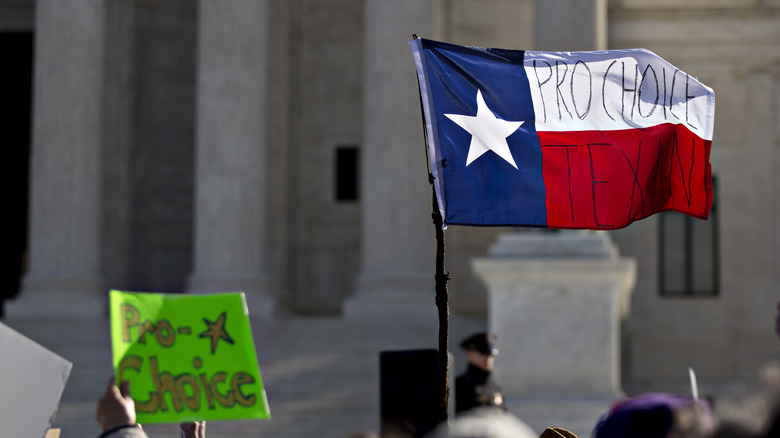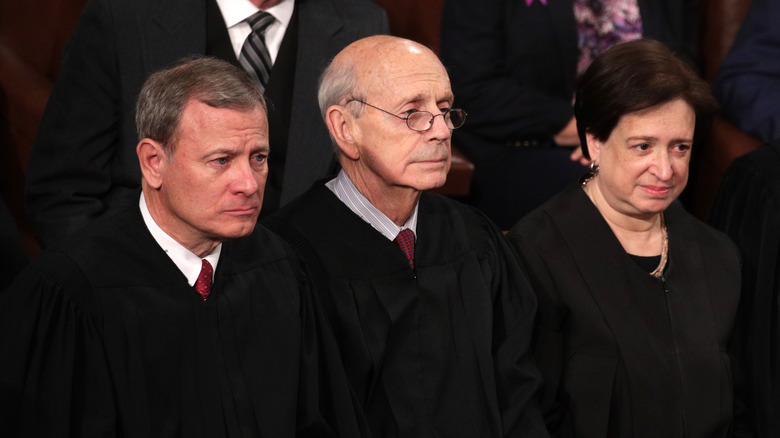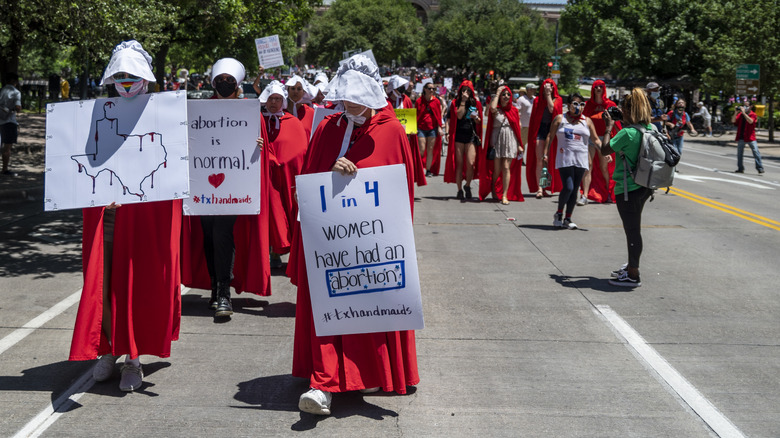Legal Expert Explains Why The Supreme Court's Texas Ruling Isn't The End Of The Issue - Exclusive
Although Roe v. Wade legalized abortion in the U.S. in 1973, terminating a pregnancy isn't a simple matter, and neither is having access to the procedure depending on where a woman lives (via Planned Parenthood). Texas' Heartbeat Act has been a lightning rod of controversy, for both pro-life and pro-choice advocates alike. For those who want women to be able to legally and safely terminate a pregnancy, this near-total ban on abortion makes it incredibly difficult (via The Texas Tribune).
However, a number of legal experts are cautioning that this isn't the end of the abortion rights issue in the state or even the U.S. As several point out, the Supreme Court didn't actually rule 5 to 4 to uphold the Texas Heartbeat Act, as constitutional lawyer Jeff Lewis of Jeff Lewis Law explains to The List.
"This is not going to set any precedent. The court has not ruled on the merits of the lawsuit or the constitutionality of the law," Lewis says. "The decision does not reveal how any of the conservative members of the court view this new law. The ramifications are that until the lawyers file a renewed or better legal challenge, the vast majority of abortions are effectively now illegal in Texas."
The Supreme Court refused to block the Texas law by a 5-4 vote
As Justice Samuel Alito explained in the decision he penned on behalf of the majority, pro-choice advocates had asked the Supreme Court to block the Heartbeat Act without giving any valid reasons for the court to do that. "The applicants now before us have raised serious questions regarding the constitutionality of the Texas law at issue. But their application also presents complex and novel antecedent procedural questions on which they have not carried their burden," Alito wrote (via CBS DFW).
Both Chief Justice John Roberts and Justice Stephen Breyer dissented because they felt the law should be blocked until the merits of the case had been properly considered and it had gone through the appeals process (via The New York Times). Justice Elena Kagan's dissent was also based on a procedural matter — because, in her words "the majority had acted without any guidance from the Court of Appeals — which is right now considering the same issues. It has reviewed only the most cursory party submissions, and then only hastily. And it barely bothers to explain its conclusion ..." (via Supreme Court).
Expert cites potential policy conflict from The Heartbeat Act
But attorney Jeff Lewis tells The List that there is another, stickier problem that Texas' anti-abortion law raises, which is also worth considering: when lawsuits allowed under the Heartbeat Act are used to try and discourage pro-choice activists from speaking their minds. "Texas has a very strong SLAPP Law," Lewis says, referring to strategic lawsuits against public participation, or lawsuits which are filed with the intent to frighten or threaten opponents so that they are silenced.
"It will be interesting to see the intersection of SLAPP law in this new abortion law. What happens when people speak out in favor of abortion and get sued for speaking out under the new abortion law. If this falls within both the anti-SLAPP law and abortion law you could see two interesting policy conflicts: the right to free speech and the Texas legislature's intent in outlying abortion."
Texas' Heartbeat Act is the strictest anti-abortion law in the country
There were strong reactions on both sides of the abortion rights issue when the Supreme Court declined to block the Heartbeat Act, which prohibits most abortions past the first six weeks of pregnancy (via The Dallas Morning News). This restrictive measure translates into a near-total ban on abortions, since pro-choice advocates say approximately 85% of abortions are performed after the sixth week, since many women don't realize they're pregnant prior to that (via The Texas Tribune).
The issue of who could and couldn't choose to have a legal abortion in Texas wasn't the only provision that raised eyebrows. The law doesn't allow for abortions to be carried out even in cases of incest or rape. Further, with the potential monetary award if a plaintiff wins a lawsuit, it could encourage private citizens to sue anyone who might have helped a woman obtain an abortion.
This means doctors, clinic staff, funding parties, or even someone who drove a woman to an abortion clinic can be sued. If the plaintiff wins, he or she is entitled to $10,000 and legal fees. However, even if defendants win their case, they're still responsible for their own legal expenses (via The New York Times). There are fears that the no-risk, high-reward nature of the Heartbeat Act could encourage anti-abortion bounty hunters, particularly since anyone filing suit doesn't have to have a personal stake in a case in order to file one (via The Texas Tribune).



